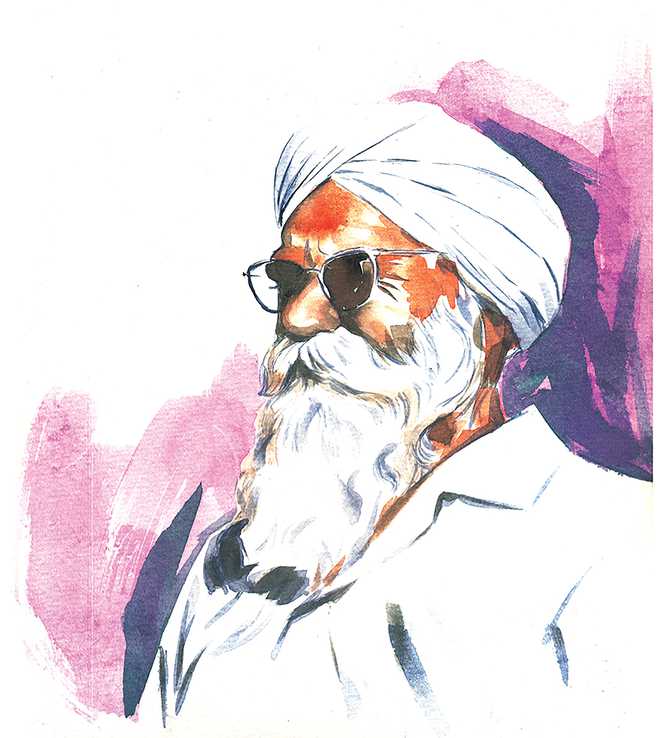
Gurbakhsh Singh Preetlari. Illustration: Sandeep Joshi
Kuldip Singh Dhir
Gurbakhsh Singh Preetlari, born at Sialkot on April 26, 1895, was a dream seller whose literature motivated generations of Punjabi youth with dreams of just and equitable social environs. Interestingly, without being a cardholder of any Left party, he was able to rally around a large number of people of the Leftist ideology. All his life he remained ahead of his times. He commented with fearlessness on whatever he wrote. It indicated the progressive nature of our cultural tradition that he shifted from serenading glamour of capitalist liberalism to progressive socialist ideology.
Gurbakhsh Singh was studying for F.Sc at Sialkot but had to abandon studies due to financial constraints. He worked as a clerk for some time before joining Thomson Engineering College (now IIT), Roorkee, to get a diploma in civil engineering in 1917. He then joined the army and was deployed in Baghdad. Two years later he resigned and moved to US to earn a B.Sc in civil engineering from Michigan in 1922.
He spent another two years there travelling widely. Cleanliness, liberalism, scientific temper, love and happiness all around had a deep impact on him during his six-year sojourn in US. This was in sharp contrast to situation back home in Punjab. He decided to return with an ambition to change it all.
Back home, he worked for the Indian Railways from 1925 to 1932. He published his first one-act play Preet Mukat in 1926, but got busy in raising a railway workshop at Dohad and a railway bridge on Chenab for the next six years.
During service, he shunned the spacious official accommodation and lived in a remote mud house. With ingenuity he transformed his modest home and gave it a novel look that visitors would marvel at.
Gurbakhsh Singh resigned in 1932 and procured 100 acres of land from the management of Smadh Akali Phula Singh to take up mechanised farming. In 1933, he stated a monthly Punjabi magazine called Preetlari to propagate his vision of life. He propounded that love is the most significant factor in life. It is the realisation and not the possession of love that matters. He exhorted people to cultivate self control, introspection, love, sacrifice, self respect and scientific outlook for a happy and balanced life. He deprecated outdated moral values, communal thinking and ugliness. He opposed exploitation and discrimination of all sorts. His novel ideas made Preetlari an instant hit. It became an instrument of socio-literary revolution, demolishing irrational beliefs and superstitions.
In 1935, he executed the construction of the sarovar and new building of Gurdwara Punja Sahib without any remuneration. He planned, designed and constructed a new township in 1938 on a vast piece of land midway between Lahore and Amritsar and named it Preet Nagar. Contemporary writers, artistes and eminent personalities of the time flocked to Preet Nagar. That also contributed to the success of Preetlari.
Gurbakhsh Singh’s first anthology of prose, Preet Marg was published in 1934 and his first novel, Unviyahi Maan, in 1937. It had run into 19 editions by 1985. His first collection of short stories Anokhe te Ikkley was published in 1940. His literary oeuvre comprises two novels, 11 collections of short stories, six dramas, 31 anthologies of prose, three volumes of autobiography, seven books of children literature and seven translations of world classics. All these ran into several editions ranging from three to 10.
He can, undoubtedly, be called the greatest prose writer and stylist of his times. As a fiction writer, he brought socio-cultural problems to centre stage. He provided Punjabi literarure the much needed psychological depth, modern idiom and sound ideological basis. The glamour of capitalist liberalism, which he started with, gave way steadily to progressive socialist Marxist slant which accentuated with time. It started with large-scale holocaust of World War II and Partition. He became a member of the World Peace Council and a leader of the peace movement.
Gurbakhsh Singh’s philosophy of love, motivational approach, ideological slant and command over Punjabi language make him an unsurpassable literary craftsman. He was honoured with Sarvotam Sahitkar Award in 1951 by the Punjab Government. He was awarded the Soviet Land Nehru Award in 1972. However, Sahitya Akademi failed to bestow its award on him denting its own image without any damage whatsoever to his literary status.



























